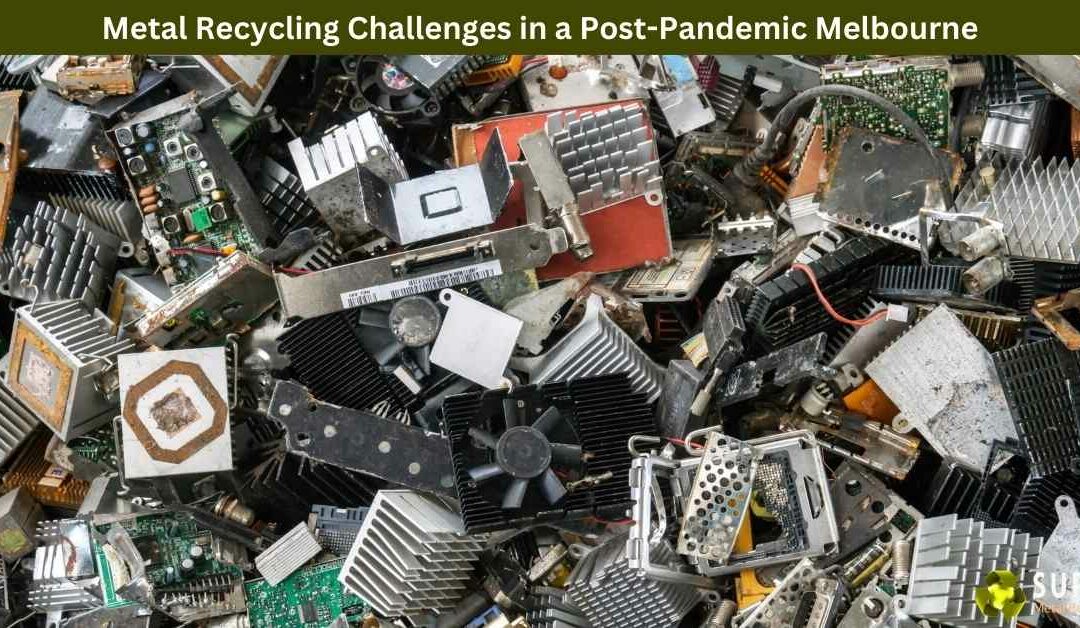The COVID-19 pandemic has left an indelible mark on various industries worldwide, and metal recycling is no exception. As Melbourne emerges from the pandemic, the metal recycling sector faces a unique set of challenges that must be navigated to ensure a sustainable future. From supply chain disruptions to fluctuating demand and changing regulations, let’s explore the key issues confronting metal recycling in a post-pandemic Melbourne and the strategies being implemented to overcome them.
Supply Chain Disruptions
One of the most significant challenges faced by the metal recycling industry during the pandemic was the disruption of global supply chains. Lockdowns, restrictions, and labor shortages affected the collection, transportation, and processing of scrap metal. Many recycling facilities experienced a slowdown in operations due to reduced workforce availability and safety measures aimed at curbing the spread of the virus.
Post-pandemic, these supply chain disruptions continue to pose a challenge. While restrictions have eased, the industry is still grappling with the ripple effects, such as delays in the import and export of metal scrap and a backlog in processing. To address these issues, recycling companies in Melbourne are investing in local supply chains, enhancing their infrastructure, and diversifying their sources of scrap metal.
Fluctuating Demand and Market Prices
The pandemic led to significant fluctuations in demand for recycled metals, impacting market prices. During the height of the pandemic, demand for certain metals, such as aluminum and steel, dropped as construction and manufacturing activities slowed down. Conversely, the demand for other metals, like copper, surged due to increased reliance on electronics and telecommunications.
In the post-pandemic period, the metal recycling industry faces the challenge of stabilizing demand and prices. The market is still adjusting to the new normal, with some sectors recovering faster than others. To navigate this uncertainty, metal recyclers in Melbourne are closely monitoring market trends, fostering relationships with key industries, and exploring new applications for recycled metals to ensure a steady demand.
Changing Regulations and Compliance
The pandemic has prompted governments and regulatory bodies to re-evaluate environmental policies and regulations, leading to changes that impact the metal recycling industry. In Melbourne, stricter regulations on waste management and recycling practices have been introduced to promote sustainability and reduce environmental impact.
Compliance with these new regulations presents a challenge for metal recyclers, requiring investment in updated technology and processes. Recycling companies must adapt to ensure they meet the latest standards for waste handling, emissions control, and worker safety. This includes implementing more efficient sorting and processing techniques, upgrading equipment, and providing ongoing training for employees.
Labor Shortages and Workforce Management
The pandemic exacerbated labor shortages across various sectors, including metal recycling. The industry relies heavily on skilled labor for tasks such as sorting, processing, and transporting scrap metal. During the pandemic, many workers left the industry due to health concerns, and recruitment of new talent has been slow.
In the post-pandemic landscape, addressing labor shortages is a critical challenge. Metal recycling companies in Melbourne are focusing on attracting and retaining skilled workers by offering competitive wages, improving working conditions, and providing opportunities for career advancement. Additionally, there is a push towards automation and the adoption of advanced technologies to reduce reliance on manual labor and increase efficiency.
Community Engagement and Public Awareness
The pandemic has heightened public awareness about environmental issues and the importance of recycling. However, there is still a need to educate and engage the community about the specific challenges and benefits of metal recycling. Misconceptions about the recycling process and the value of recycled metals can hinder efforts to increase recycling rates.
To tackle this challenge, metal recyclers in Melbourne are ramping up community outreach and education programs. These initiatives aim to inform the public about the environmental and economic benefits of metal recycling, promote proper recycling practices, and encourage participation. By fostering a culture of sustainability, the industry can build stronger support and collaboration with the community.
Embracing Innovation and Technology
Innovation and technology play a crucial role in overcoming the challenges faced by the metal recycling industry in a post-pandemic Melbourne. From advanced sorting systems and automated processing lines to data analytics and digital platforms, technology can enhance efficiency, reduce costs, and improve environmental outcomes.
Recycling companies are investing in research and development to explore new methods for recovering and repurposing metals. Collaborations with tech companies and research institutions are driving innovation, leading to the development of cutting-edge solutions that can transform the industry. By embracing technology, the metal recycling sector can build resilience and adapt to future challenges.
Conclusion
The post-pandemic era presents both challenges and opportunities for the metal recycling industry in Melbourne. Supply chain disruptions, fluctuating demand, regulatory changes, labor shortages, and the need for community engagement are just some of the issues that must be addressed. However, with strategic investments, innovation, and a commitment to sustainability, the industry can navigate these challenges and continue to thrive. As Melbourne rebuilds and recovers, the metal recycling sector will play a vital role in promoting environmental stewardship and supporting a circular economy.
If you are in Clayton South, Victoria 3169, and looking for a metal recycling service, this is the best way to visit us.
Super Metal Recycling
345 Frankston – Dandenong Road, Dandenong South VIC 3175
(03) 9706 4909


Recent Comments